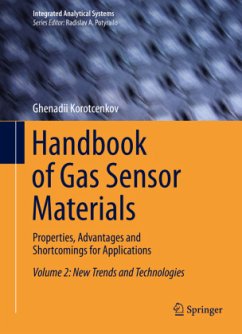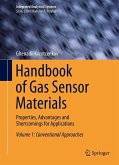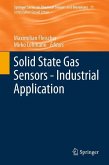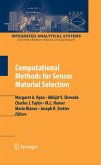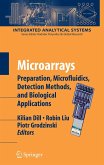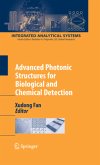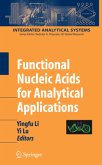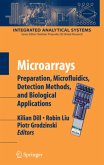Ghendaii Korotcenkov
Handbook of Gas Sensor Materials
Properties, Advantages and Shortcomings for Applications Volume 2: New Trends and Technologies
Ghendaii Korotcenkov
Handbook of Gas Sensor Materials
Properties, Advantages and Shortcomings for Applications Volume 2: New Trends and Technologies
- Gebundenes Buch
- Merkliste
- Auf die Merkliste
- Bewerten Bewerten
- Teilen
- Produkt teilen
- Produkterinnerung
- Produkterinnerung
The two volumes of Handbook of Gas Sensor Materials provide a detailed and comprehensive account of materials for gas sensors, including the properties and relative advantages of various materials. Since these sensors can be applied for the automation of myriad industrial processes, as well as for everyday monitoring of such activities as public safety, engine performance, medical therapeutics, and in many other situations, this handbook is of great value. Gas sensor designers will find a treasure trove of material in these two books.
Andere Kunden interessierten sich auch für
![Handbook of Gas Sensor Materials Handbook of Gas Sensor Materials]() Ghenadii KorotcenkovHandbook of Gas Sensor Materials152,99 €
Ghenadii KorotcenkovHandbook of Gas Sensor Materials152,99 €![Solid State Gas Sensors - Industrial Application Solid State Gas Sensors - Industrial Application]() Solid State Gas Sensors - Industrial Application151,99 €
Solid State Gas Sensors - Industrial Application151,99 €![Computational Methods for Sensor Material Selection Computational Methods for Sensor Material Selection]() Margaret A. Ryan / Abhijit V. Shevade / Charles J. Taylor / M. L. Homer / Mario Blanco (eds.)Computational Methods for Sensor Material Selection113,99 €
Margaret A. Ryan / Abhijit V. Shevade / Charles J. Taylor / M. L. Homer / Mario Blanco (eds.)Computational Methods for Sensor Material Selection113,99 €![Microarrays Microarrays]() Kilian Dill / Robin Liu / Piotr Grodzinsky (eds.)Microarrays113,99 €
Kilian Dill / Robin Liu / Piotr Grodzinsky (eds.)Microarrays113,99 €![Advanced Photonic Structures for Biological and Chemical Detection Advanced Photonic Structures for Biological and Chemical Detection]() Advanced Photonic Structures for Biological and Chemical Detection153,99 €
Advanced Photonic Structures for Biological and Chemical Detection153,99 €![Functional Nucleic Acids for Analytical Applications Functional Nucleic Acids for Analytical Applications]() Functional Nucleic Acids for Analytical Applications106,99 €
Functional Nucleic Acids for Analytical Applications106,99 €![Microarrays Microarrays]() Microarrays83,99 €
Microarrays83,99 €-
-
-
The two volumes of Handbook of Gas Sensor Materials provide a detailed and comprehensive account of materials for gas sensors, including the properties and relative advantages of various materials. Since these sensors can be applied for the automation of myriad industrial processes, as well as for everyday monitoring of such activities as public safety, engine performance, medical therapeutics, and in many other situations, this handbook is of great value. Gas sensor designers will find a treasure trove of material in these two books.
Produktdetails
- Produktdetails
- Integrated Analytical Systems
- Verlag: Springer / Springer New York / Springer, Berlin
- Artikelnr. des Verlages: 978-1-4614-7387-9
- Seitenzahl: 476
- Erscheinungstermin: 7. November 2013
- Englisch
- Abmessung: 260mm x 183mm x 31mm
- Gewicht: 1034g
- ISBN-13: 9781461473879
- ISBN-10: 146147387X
- Artikelnr.: 37537779
- Herstellerkennzeichnung
- Springer-Verlag KG
- Sachsenplatz 4-6
- 1201 Wien, AT
- ProductSafety@springernature.com
- Integrated Analytical Systems
- Verlag: Springer / Springer New York / Springer, Berlin
- Artikelnr. des Verlages: 978-1-4614-7387-9
- Seitenzahl: 476
- Erscheinungstermin: 7. November 2013
- Englisch
- Abmessung: 260mm x 183mm x 31mm
- Gewicht: 1034g
- ISBN-13: 9781461473879
- ISBN-10: 146147387X
- Artikelnr.: 37537779
- Herstellerkennzeichnung
- Springer-Verlag KG
- Sachsenplatz 4-6
- 1201 Wien, AT
- ProductSafety@springernature.com
Ghenadii Korotcenkov has more than 40 years experience as a teacher and scientific researcher. He received his Ph.D. in Physics and Technology of Semiconductor Materials and Devices in 1976, and his Habilitate Degree (Dr. Sci.) in Physics and Mathematics of Semiconductors and Dielectrics in 1990. For many years, he led the scientific Gas Sensor Group and managed various national and international scientific and engineering projects carried out in the Laboratory of Micro- and Optoelectronics, Technical University of Moldova. Since 2008, Korotcenkov has been a research Professor in Gwangju Institute of Science and Technology, Republic of Korea. Korotcenkov's research results are well-known in the study of Schottky barriers, MOS structures, native oxides, and photoreceivers on the base of III-Vs compounds. His current research interests include material sciences and surface science, focused on metal oxides and solid state gas sensor design. Korotcenkov is the author or editor of sixteen books and special issues, twelve invited review papers, nineteen book chapters, and more than 190 peerreviewed articles. He is a holder of 18 patents. Recently, his articles had more than 250 cites per annum. His research activities have been honored by Award of the Supreme Council of Science and Advanced Technology of the Republic of Moldova (2004), The Prize of the Presidents of Ukrainian, Belarus and Moldovan Academies of Sciences (2003), Senior Research Excellence Award of Technical University of Moldova (2001; 2003; 2005), Fellowship from International Research Exchange Board (1998), National Youth Prize of the Republic of Moldova (1980), among others.has more than 40 years experience as a teacher and scientific researcher. He received his Ph.D. in Physics and Technology of Semiconductor Materials and Devices in 1976, and his Habilitate Degree (Dr. Sci.) in Physics and Mathematics of Semiconductors and Dielectrics in 1990. For many years, he led the scientific GasSensor Group and managed various national and international scientific and engineering projects carried out in the Laboratory of Micro- and Optoelectronics, Technical University of Moldova. Since 2008, Korotcenkov has been a research Professor in Gwangju Institute of Science and Technology, Republic of Korea. Korotcenkov's research results are well-known in the study of Schottky barriers, MOS structures, native oxides, and photoreceivers on the base of III-Vs compounds. His current research interests include material sciences and surface science, focused on metal oxides and solid state gas sensor design. Korotcenkov is the author or editor of sixteen books and special issues, twelve invited review papers, nineteen book chapters, and more than 190 peerreviewed articles. He is a holder of 18 patents. Recently, his articles had more than 250 cites per annum. His research activities have been honored by Award of the Supreme Council of Science and Advanced Technology of the Republic of Moldova (2004), The Prize of the Presidents of Ukrainian, Belarus and Moldovan Academies of Sciences (2003), Senior Research Excellence Award of Technical University of Moldova (2001; 2003; 2005), Fellowship from International Research Exchange Board (1998), National Youth Prize of the Republic of Moldova (1980), among others.
Conventional gas sensor materials.- Auxiliry materials.- Materials for specific gas sensors.- Nanostructered gas sensing materials.- Other trends in design of gas sensor materials.- Nanocomposites.- Stability of gas sensing materials and related processes.- Structure and surface modifications of gas sensing materials.
Conventional gas sensor materials.- Auxiliry materials.- Materials for specific gas sensors.- Nanostructered gas sensing materials.- Other trends in design of gas sensor materials.- Nanocomposites.- Stability of gas sensing materials and related processes.- Structure and surface modifications of gas sensing materials.

